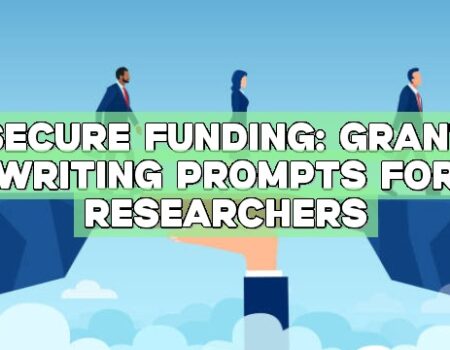Research proposals are a critical component of academic success. They demonstrate an understanding of the research problem and the ability to justify the proposed research. However, crafting an effective research proposal can be a daunting task. This is where research proposal prompts come in.
Research proposal prompts are essential prompts that guide the writing process, ensuring that research proposals are clear, specific, and actionable. They provide a roadmap for researchers to follow, making it easier to organize research ideas into a cohesive proposal.
In this article, we will explore the power of research proposal prompts and how they can be used to unlock academic success. We will discuss the different types of research proposal prompts, provide guidelines for crafting effective prompts, and demonstrate how to incorporate prompts into the writing process.
Key Takeaways
- Research proposal prompts are essential for crafting effective proposals that demonstrate an understanding of the research problem.
- There are different types of research proposal prompts, each with a specific function in guiding the writing process.
- Crafting effective prompts requires clear and specific language, providing a roadmap for researchers to follow.
- Research proposal prompts should be incorporated into the writing process to ensure seamless integration and to increase the likelihood of academic success.
Understanding Research Proposals
A research proposal is a document that outlines the purpose, objectives, and methodology of a research project. It is an essential component of research and serves as a blueprint for guiding the research process.
The purpose of a research proposal is to convince a potential sponsor or supervisor to support the research project. It should provide a clear description of the research problem and showcase why it is significant. Additionally, it should explain the expected outcomes of the research and how it will contribute to the body of knowledge in the field.
The essential components of a research proposal include the research question, literature review, methodology, and expected outcomes. The research question is the main problem that the research project aims to address. The literature review provides a background and context for the research problem. The methodology explains how the research will be conducted, including the data collection and analysis methods. Finally, the expected outcomes outline the potential contributions the research will make to the field of study.
The Power of Research Proposal Prompts
Research proposal prompts are essential tools in guiding the process of writing a successful research proposal. The impact of these prompts on the effectiveness of the research proposal cannot be overstated. Well-crafted prompts can facilitate the development of clear and focused research questions, which ultimately lead to a more impactful thesis.
The effectiveness of research proposal prompts lies in their ability to provide clear direction throughout the writing process. When used effectively, prompts can help writers identify and narrow down research topics, establish the significance of their research questions, and clarify the research methodology. Additionally, prompts can ensure that writers adhere to the required format and structure of the research proposal, enhancing the clarity and organization of the final product.
Types of Research Proposal Prompts
Effective research proposal prompts guide scholars through the writing process, ensuring that their proposals are well-structured and focused. Different types of prompts can be used to facilitate this process. Here are some examples:
| Types of Prompts | Description |
|---|---|
| Directives | These prompts direct the writer to undertake specific tasks, such as defining key terms or outlining the research’s focus. |
| Reflective prompts | These prompts prompt self-analysis and encourage writers to reflect on their findings, theories, or methodologies. |
| Open-Ended prompts | These prompts allow writers to explore a wider range of topics and articulate their ideas freely. |
| Closed-Ended prompts | These prompts ask writers for specific, concise answers, requiring them to keep their ideas and arguments focused. |
It is important to consider the specific needs of the research when selecting prompts. Different prompts are best suited to different types of research, and they can be adapted to suit the writer’s preferences and writing style.
Directives
Directives are among the most common types of research proposal prompts. They require the writer to undertake specific tasks that are necessary to create a strong proposal. Some examples of directive prompts include:
- Define the key terms of the research question.
- Outline the basic research methodology to be used.
- Identify the research objectives and outcomes.
- List the research questions and hypotheses.
Directives are great for ensuring that the writer stays on track and doesn’t get lost in tangential topics. They can also help to break down the research process into manageable steps.
Reflective Prompts
Reflective prompts encourage writers to think critically about their research and writing. They can be used to assess the effectiveness of the research and its relevance to the proposed topic. Some examples of reflective prompts include:
- What is the rationale behind the research question?
- What are the potential challenges of the research methodology?
- How might the research be used in different contexts?
Reflective prompts are great for encouraging writers to think deeply about their research and its implications. They can also help to identify areas of the research that may need further study or refinement.
Crafting Effective Prompts for Research Proposals
Creating effective prompts is a crucial element of successful research proposal writing. An effective prompt should be clear, specific, and actionable. Below are some best practices to help craft effective prompts:
- Define the scope of the research: A clear and specific prompt should outline the research’s scope, including the research question or hypothesis, the target population, and the research aims and objectives. A prompt must also define the expected outcomes and explain how the research will contribute to the relevant field of study.
- Use simple and straightforward language: Overly technical language or jargon can make a prompt challenging to understand. Therefore, try to use simple and straightforward language to ensure that the prompt is concise and direct. Avoid vagueness and ambiguity by using specific and precise terms to explain the research aims and objectives.
- Provide clear instructions: A prompt should provide clear instructions on the research methodology, data collection, and analysis methods. It should also specify the expected timeline and available resources for the research. When writing prompts, use active and positive language to encourage the researcher to engage with the research process positively.
- Collaborate with potential participants: Collaboration with potential participants can help tailor the prompts to their needs. The researcher can collaborate with the participants’ target group and ask for feedback and suggestions on the prompt’s wording and structure. This collaboration can also provide insights into the participants’ perspectives, allowing researchers to phrase the prompt in a way that is understandable and engaging.
- Be adaptable: A prompt should be adaptable to different research contexts, and in case of any changes in the research scope or methodology, the prompt should be modified accordingly. For instance, if the research question changes, the prompt should be revised to reflect the new research question accurately.
Examples:
Here are some examples of effective prompts for research proposals:
| Prompt | Explanation |
|---|---|
| What is the impact of COVID-19 on mental health among healthcare workers in the US? | This prompt defines the research question, target population, and expected outcome. |
| Using a mixed-methods design, investigate the factors that affect the adoption of digital health technologies among elderly patients in the UK. | This prompt is specific in outlining the research methodology, target population, and expected outcome. |
| Examine the effect of mindfulness meditation on reducing stress levels among college students, using a quasi-experimental design. | This prompt is clear and direct in outlining the research aims, methodology, and expected outcome. |
Effective prompts are essential in structuring research proposals that are clear, actionable, and impactful. By following the best practices outlined above, researchers can create prompts that help them focus their research and achieve academic success.
Example Prompts for Research Proposals
Effective research proposal prompts can guide you through the writing process and ensure your research is impactful. Here are some examples of research proposal prompts for a variety of disciplines:
-
Topic: Artificial Intelligence
- What are the current trends and challenges in artificial intelligence?
- How can machine learning algorithms be used to solve real-world problems?
- What ethical implications should be considered when developing AI technology?
-
Topic: Environmental Science
- What are the main sources of air pollution in urban areas?
- How can we reduce carbon emissions to mitigate the effects of climate change?
- What are effective strategies for conserving biodiversity in marine ecosystems?
-
Topic: Psychology
- What are the effects of childhood trauma on adult mental health?
- How can cognitive behavior therapy be used to treat anxiety disorders?
- What are the most effective interventions for substance use disorders?
These example prompts provide a starting point for structuring your research proposal. However, it is important to tailor your prompts to your specific research question and goals.
The Role of Long Prompts in Complex Research Proposals
When dealing with complex research tasks, longer prompts can play a vital role in shaping effective research proposals. Long prompts allow for more detailed guidance and help tackle intricate research problems. They provide a clear direction for the research questions and hypotheses and facilitate a more coherent argument.
Long prompts are especially useful for research proposals that involve multiple stages or methods, as they outline each step of the process and set out clear expectations for each stage. The use of long prompts helps researchers stay on track and avoid deviating from the research question.
Incorporating long prompts in research proposals is particularly important in interdisciplinary research, where the researcher may be working in an unfamiliar field or with a new set of methodologies. Long prompts can provide the necessary background information and context to help the researcher understand the research problem and design a suitable research plan.
It is essential to ensure that long prompts are clear, specific, and actionable. They should be designed to assist the researcher in achieving each research stage effectively and efficiently. Long prompts should be written in a way that breaks down complex tasks into manageable steps, enabling the researcher to progress through the research proposal with confidence.
In conclusion, the use of long prompts in research proposals can help researchers effectively and efficiently tackle complex research tasks. By offering detailed guidance and outlining clear expectations for each research stage, long prompts can help researchers stay on track and design more coherent research proposals.
The Role of Long Prompts in Complex Research Proposals
When dealing with complex research tasks, long prompts can provide more detailed guidance to tackle intricate problems. While short prompts are useful for straightforward research proposals, longer prompts can assist in breaking down complex tasks into smaller, manageable pieces.
Incorporating background information into longer prompts is also vital for understanding the context of the research problem. By providing sufficient background information, you can ensure that the reader is equipped with the necessary knowledge to understand the prompt and execute the research proposal effectively.
| Tip: | Consider using bullet points or numbered lists within longer prompts to outline specific research tasks clearly. |
|---|
Breaking Down Complex Tasks with Background Information
Breaking down complex tasks into smaller pieces is a useful technique to manage the research process. Along with longer prompts, providing background information is equally important to understand complex research problems. The background information can provide context and assist in breaking down the complex task into smaller steps. Here are some ways you can implement this:
- Provide definitions of keywords and terms used in the research problem.
- Explain the significance of the research problem in the broader context.
- Describe previous research on the topic and its limitations.
- Provide a theoretical framework for the research problem.
By incorporating these elements into the prompt, you can ensure that the research proposal is well-structured and easily understood.
Incorporating Research Proposal Prompts into the Writing Process
Once you have crafted effective research proposal prompts, it is essential to know how to incorporate them into your writing process. Here are some steps to follow:
- Understand the prompts: Before starting to write, read through the prompts and make sure you comprehend their intended meaning and direction.
- Organize your thoughts: Use the prompts to structure your research proposal and organize your thoughts. Create an outline or a mind map to visualize your ideas and see how they fit together.
- Write your draft: Start writing your research proposal, beginning with the introduction and the problem statement. Use the prompts to guide each section, making sure you address all relevant points.
- Add supporting evidence: Use the prompts to incorporate supporting evidence, such as research studies or statistics, to validate your arguments.
- Revise and edit: Once you finish the first draft, review it carefully and make necessary revisions and edits. Ensure that your research proposal is coherent, clear, and error-free.
Using research proposal prompts effectively can streamline the writing process and help you create a well-structured proposal. Remember to refer back to the prompts frequently and check that you haven’t deviated from their intended meaning.
Evaluating the Impact of Research Proposal Prompts
After crafting effective prompts and incorporating them into the research proposal, it is crucial to evaluate their impact and effectiveness. This step allows writers to assess whether the prompts were successful in guiding their research proposal writing process and detecting areas that may require improvement. Below are some strategies for evaluating the impact of research proposal prompts:
- Peer Review: Seeking feedback from colleagues or mentors who can review the research proposal and provide constructive criticism can be a valuable way to evaluate the effectiveness of prompts.
- Comparative Analysis: Comparing the research proposal with others in the same discipline or field can provide insights into how effective the prompts were in guiding the writing process.
- Data Analysis: Analyzing data collected during the research process can help writers determine whether the prompts led to more efficient and effective research outcomes.
- Self-Assessment: Reflecting on the research proposal writing process and assessing whether the prompts helped in achieving the desired outcomes can also be useful in evaluating their impact.
Evaluating the impact of research proposal prompts is an ongoing process and helps writers improve their writing skills over time. By continuously assessing their effectiveness, researchers can refine and improve their prompts to write better proposals and increase their chances of academic success.
Advantages of Using ChatGPT for Research Proposal Prompts
ChatGPT is an AI-powered language model that can generate prompt-based responses and provide guidance in various academic contexts, including research proposals. Here are some advantages of using ChatGPT for research proposal prompts:
| Advantages | Description |
|---|---|
| Efficiency | ChatGPT can generate prompts quickly, saving time for researchers. |
| Customizability | ChatGPT can create prompts based on specific research goals, making them personalized and tailored to the research needs. |
| Unbiased Prompt Writing | ChatGPT can generate prompts that are free of any bias or preconceived notions, providing researchers with a fresh perspective on their research questions. |
| Rich Responses | ChatGPT can provide detailed and informative responses based on the generated prompts, which can help researchers to structure their research proposals more effectively. |
In summary, ChatGPT can assist in crafting effective research proposal prompts by providing customized and unbiased guidance quickly and efficiently. This can help improve the quality of research proposals and increase the likelihood of academic success.
Conclusion: Unlocking Academic Success with Research Proposal Prompts
In conclusion, research proposal prompts are essential tools that can significantly impact the success of academic research. Using effective prompts can help structure the research proposal and ensure it meets the required components and purpose.
Crafting suitable prompts for research proposals can be challenging, but it is a crucial step in the writing process. The prompts should be clear, specific, and actionable, guiding the research in the right direction. Longer prompts are particularly useful for complex tasks, providing more detailed guidance and outlining the research scope.
Background information is essential in breaking down complex research tasks, facilitating the use of prompts effectively. Incorporating research proposal prompts into the writing process can help maintain the research’s focus and make the writing process more efficient.
Evaluating the impact of research proposal prompts is also essential in improving their effectiveness. Adjustments can be made to prompts as needed to ensure they provide the necessary guidance to the research.
Using ChatGPT can provide several advantages for generating and responding to research proposal prompts. It can save time and effort in crafting suitable prompts and provide diverse examples for different research areas.
In conclusion, research proposal prompts are valuable instruments that can aid academic success. By following the strategies and techniques presented in this article, readers can enhance their research proposal writing skills and unlock their academic potential. Remember, effective prompts are the key to successful academic research.
FAQ
Q: What is the importance of structuring research proposals?
A: Structuring research proposals is essential for academic success as it helps to provide a clear and organized framework for conducting research. A well-structured proposal increases the chances of approval and funding for the research project.
Q: What are research proposals?
A: Research proposals are documents that outline a proposed research project. They serve to convince the intended audience, such as funding agencies or academic institutions, of the feasibility and significance of the research.
Q: How can effective prompts enhance research proposals?
A: Effective prompts can enhance research proposals by providing guidance and direction for the writing process. They help researchers focus their ideas, structure their arguments, and ensure that all necessary components are included in the proposal.
Q: What are the types of research proposal prompts?
A: There are various types of research proposal prompts, including questions that prompt the researcher to define their research problem, outline their methodology, articulate their research objectives, and explain the significance of their research.
Q: How can I craft effective prompts for my research proposal?
A: To craft effective prompts, it is important to ensure they are clear, specific, and actionable. Consider using prompts that prompt the researcher to provide specific details, justify their research approach, or address potential limitations of the research.
Q: Can you provide some examples of research proposal prompts?
A: Certainly! Here are a few examples of research proposal prompts:
– What is the specific research problem you aim to address?
– Describe your proposed research methodology and explain why it is appropriate for your study.
– What are the expected outcomes and significance of your research?
Q: Why are longer prompts important for complex research proposals?
A: Longer prompts are important for complex research proposals because they provide more detailed guidance and instructions. They help researchers navigate intricate research problems and ensure that all relevant aspects are addressed in the proposal.
Q: How can incorporating background information help with complex research tasks?
A: Incorporating background information can help with complex research tasks by providing the necessary context and understanding of the subject. It aids in breaking down complex concepts and allows researchers to develop more effective prompts for their proposals.
Q: How can research proposal prompts be incorporated into the writing process?
A: Research proposal prompts can be incorporated into the writing process by using them as a framework for organizing and structuring the content. They can serve as guiding points for each section of the proposal and ensure that all required information is included.
Q: Why is evaluating the impact of research proposal prompts important?
A: Evaluating the impact of research proposal prompts is important to gauge their effectiveness and make necessary adjustments. It helps researchers improve their writing skills and enhance the overall quality of their research proposals.
Q: What are the advantages of using ChatGPT for research proposal prompts?
A: Using ChatGPT for research proposal prompts offers advantages such as prompt generation, response suggestions, and access to a wide range of examples. It can assist researchers in brainstorming ideas, refining their prompts, and improving the overall quality of their proposals.









